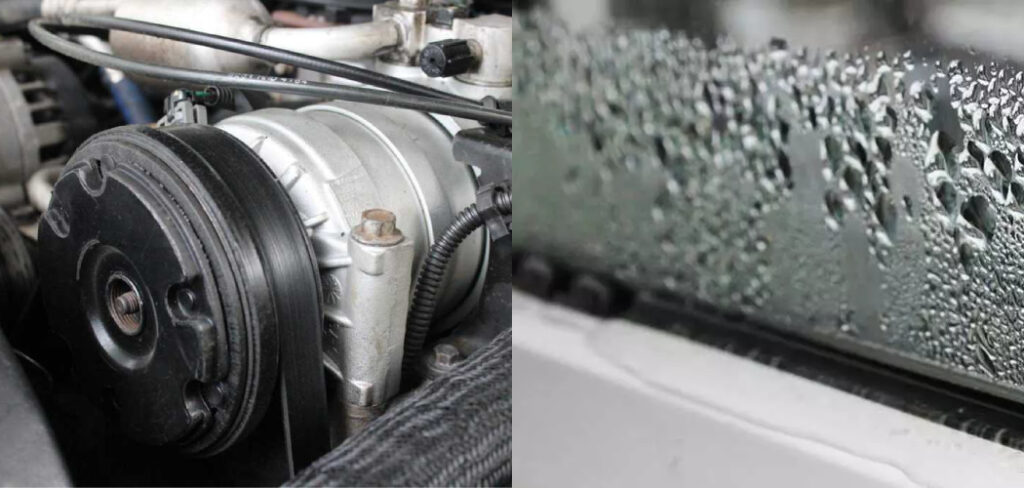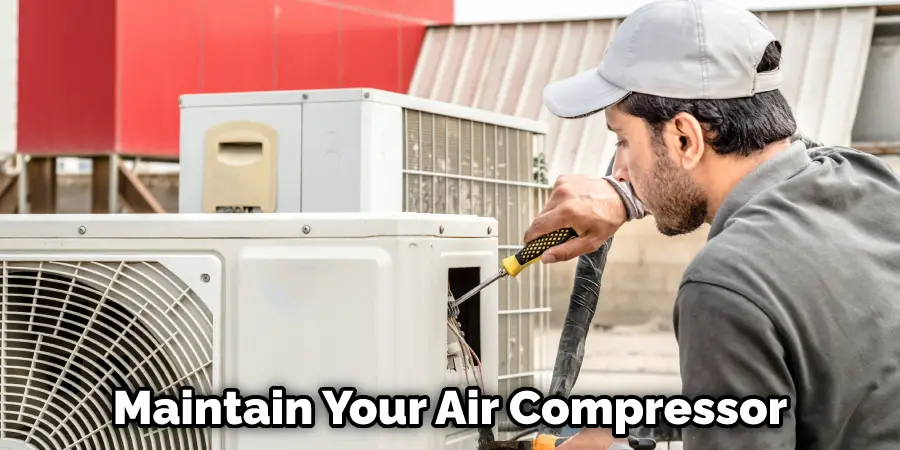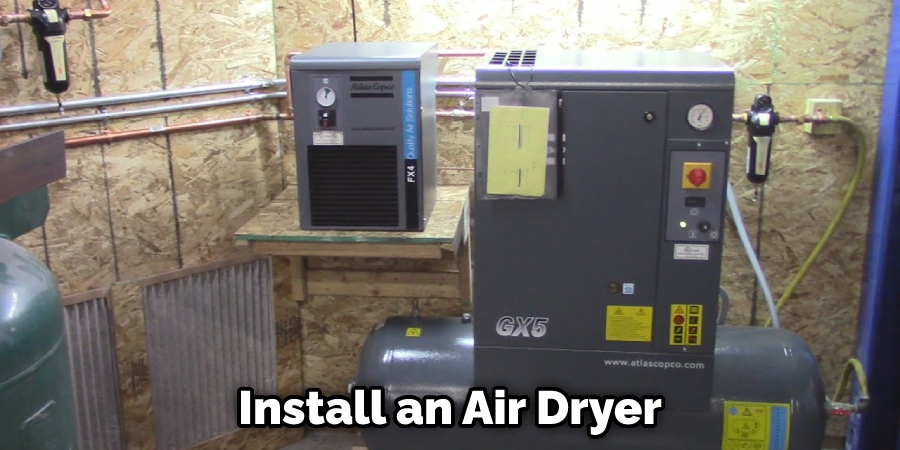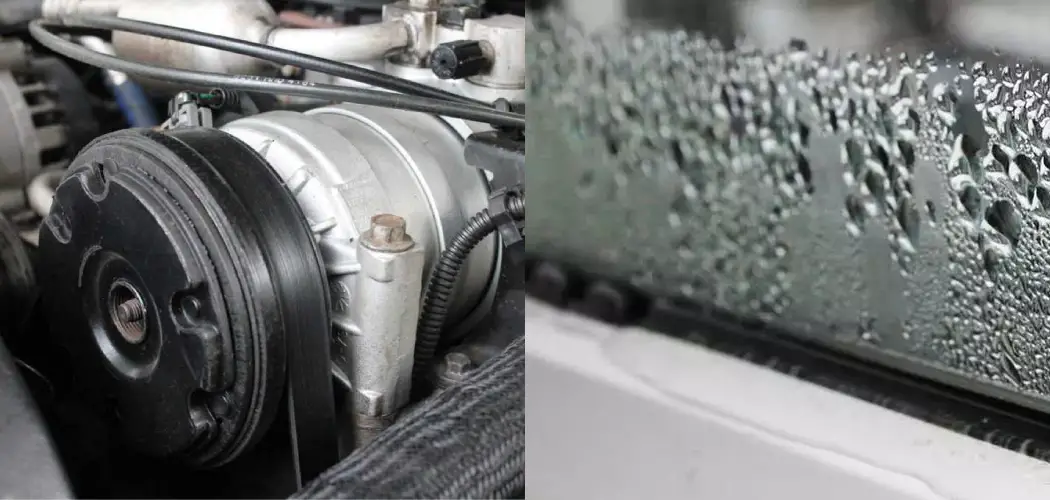An air compressor is an important tool for many DIY and professional projects. However, the compressor can be damaged by moisture in the air. In this blog post, we will show you how to remove moisture from air compressor to help protect your tool.

In industrial and commercial settings, a compressed air system is a critical component to keep operations running smoothly. However, if the compressed air system has moisture in it, this can create all sorts of problems. Keep reading to solve this problem easily. So without further ado, let’s get started!
What Problems Can Moisture Cause an Air Compressor?
Moisture in air compressors can cause a number of problems, the most common being:
1. Reduced Efficiency
When moisture mixes with the air inside the compressor, it reduces the overall efficiency of the machine. The compressed air will not be as strong and will take longer to achieve the same results.
2. Corrosion
Moisture is also one of the leading causes of corrosion in air compressors. Over time, it can break down the metal components of the compressor, causing them to fail. In some cases, corrosion can even cause the entire air compressor to catch fire. To protect your investment and keep your air compressor running smoothly, it’s essential to remove moisture from the air before it can do any damage.
3. Air Quality
Another reason to remove moisture from your air compressor is to improve the quality of the air that it produces. Moisture can cause mold and bacteria to grow inside the compressor, which can then be released into the air when the compressor is turned on. This can lead to respiratory problems for anyone in the vicinity of the compressor, so it’s important to keep the air quality as high as possible. The best way to do this is to remove moisture from the air before it has a chance to enter the compressor.
4. Freezing

If you live in a cold climate, your air compressor is susceptible to freezing. This can damage the unit and prevent it from working properly. To prevent this, drain the moisture from the unit before each use. You can do this by opening the drain valve and letting all the water drip out. You should also keep the unit in a warm, dry place to prevent it from freezing.
5. Overheating
If your air compressor overheats, it can damage the motor and other parts of the unit. To prevent this, make sure that the unit is properly ventilated and that the air intake is not blocked. You should also avoid using the unit in hot or humid conditions.
6. Proper Storage
When not in use, your air compressor should be stored in a dry, cool place. If possible, store the unit in a temperature-controlled environment. You should also drain the moisture from the unit before storing it to prevent damage from freezing.
14 Ways on How to Remove Moisture From Air Compressor
1. Check the Air Filter
The first thing you should do to remove moisture from your air compressor is to check the air filter. A clogged or dirty air filter will cause the air compressor to work harder and will not be able to remove moisture from the air properly.
2. Use a Dehumidifier
If you live in an area with high humidity, you may want to use a dehumidifier to remove moisture from the air. Dehumidifiers work by pulling moisture out of the air and can be very effective at reducing the amount of moisture in your home.

3. Use a Desiccant
A desiccant is a substance that absorbs moisture from the air. You can purchase desiccants at most hardware stores, and they are very effective at removing moisture from the air. Make sure to follow the directions on the package carefully so that you do not damage your air compressor.
4. Use an Air Purifier
An air purifier will also help to remove moisture from the air. Air purifiers work by filtering out the airborne particles that can cause allergies and asthma. Many air purifiers also have a dehumidifier function that can help to remove moisture from the air.
5. Avoid Using in Humid Conditions
If possible, avoid using your air compressor in humid conditions. The compressor will work harder in humid conditions, and the moisture will condense more easily inside the compressor. It will also be more difficult to remove the moisture from the air if the compressor is used in humid conditions.
6. Use Moisture Absorbing Packets
You can purchase moisture-absorbing packets that can be placed inside the air compressor. These packets will help to absorb the moisture in the air compressor and help to keep it dry.
7. Use a Moisture Separator
If you have an air compressor that does not have a built-in moisture separator, you can purchase one and attach it to the air compressor. This will help to remove the moisture from the air before it enters the air compressor. Otherwise, the moisture will condense inside the air compressor and can cause problems.
8. Regular Maintenance

It is important to regularly maintain your air compressor to help prevent moisture build-up. You should drain the air compressor regularly and check the seals and gaskets to make sure they are not leaking. You should also change the air filter regularly to help keep the air compressor clean.
9. Store in a Dry Place
When you are not using your air compressor, you should store it in a dry place. This will help to prevent moisture from building up inside the air compressor. It will help to keep the air compressor dry and prevent any problems from occurring.
10. Avoid Oil-free Air Compressors
Oil-free air compressors are great for a lot of reasons. They’re cheaper to operate and maintain, and they don’t require lubrication. However, they tend to produce more water vapor than their oil-lubricated counterparts. If you live in a humid climate or if you plan on using your air compressor in a dusty environment, an oil-free model is probably not the best choice.
11. Drain the Air Compressor Regularly
One of the best ways to keep your air compressor from getting too wet is to drain it regularly. Most models have a built-in drain valve that makes this task easy. Simply open the valve and allow any condensation to drain out. Depending on how often you use your air compressor, you may need to do this daily, weekly, or monthly.
12. Use an Air Compressor Filter
If you’re using your air compressor in a dusty environment, it’s a good idea to install an air filter. This will help to remove any particulates from the air before they have a chance to get into the compressor. There are a variety of different air filters available, so be sure to choose one that’s compatible with your model.
13. Install an Air Dryer
If you want to take things a step further, you can install an air dryer on your air compressor. This is an especially good idea if you live in a humid climate or if you’re using your compressor in a dusty environment. Air dryers work by removing moisture from the air before it has a chance to get into the compressor. This can help to extend the life of your compressor and keep it running more efficiently.
14. Use the Right Size Air Compressor:
As you know, there are different types and sizes of air compressors in the market. Each has its specific use. For example, small ones are used for household purposes, while large ones are used in industrial settings.

The size of your air compressor will determine the amount of moisture it can remove from the air. If you want to remove a lot of moisture, you will need a large air compressor.
Frequently Asked Questions
How Often Should I Drain My Air Compressor?
Depending on how often you use your air compressor, you should drain the moisture from the unit every few months. If you live in a humid climate or use your air compressor frequently, you may need to drain the unit more often.
Why Does My Air Compressor Have Water in It?
If your air compressor has water in it, this is most likely due to condensation. When the air inside the unit cools, it can cause water droplets to form.
Do Air Compressors Need to Be Drained?
Yes, air compressors need to be drained to remove moisture from the unit. If moisture is not removed, it can cause corrosion and rust on the unit.
Conclusion
An air compressor can be a lifesaver during the hotter months when the humidity is high. By following the tips above, you will get guidance about how to remove moisture from air compressor, and you can keep your air compressor running smoothly and without the worry of moisture damage.
If you have any questions or need help troubleshooting, feel free to contact us–we’re always happy to help our customers keep their equipment in top condition!
Rick is a handyman who grew up helping his dad with his business. He learned a lot from him about how to fix things, and also about how to work hard and take care of business. These days, Rick is still into fixing things- only now, he’s doing it for a living.
Rick is always looking for new ways to help people grow and develop. That’s why he started contributing to this blog: to share all his experience and knowledge so that he can help people who are interested in DIY repair.

